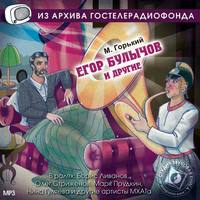
The Spy
Yevsey took up his hat, flung his coat over his shoulders, and walked away with bowed head. Several minutes later he was sitting on a bench at the gate of a house, mumbling as if drunk:
"The baggage!" But he had to strain himself to bring out the epithet. It was not genuine. He ransacked all the shameful names for a woman, all ugly oaths, and poured them over the tall, shapely figure of Olga, desiring to sully every bit of her with mud, to darken her from head to foot, in order not to see her face and eyes. But oaths did not cling to her. She stood before his eyes, stretching out her hands, pushing him away, serene and white. Her image robbed his oaths of their force, and though Yevsey persistently roused anger within himself, he felt only shame.
He looked for a long time at the round solitary ball of the moon, which moved in the sky in bounds, as if leaping like a large bright rubber ball; and he heard the quiet sound of its motion, resembling the beatings of a heart.
He did not love this pale melancholy disk, which always seemed to watch him with cold obstinacy in the heavy movements of his life. It was late, but the city was not yet asleep. From all sides floated sounds.
"Formerly the nights were quieter," thought Klimkov. He rose, and walked away, without putting his arms into the sleeves of his coat, his hat pushed back on his neck.
"Well, all right, wait," he thought, doing violence to himself. Finally he decided, "I'll deliver them over, and as a reward I'll ask to be transferred to another city. That's all."
He reluctantly surrendered himself to the desires to revenge himself upon Olga, and strengthened the feeling with a supreme effort. Nevertheless it continued to cover his heart with a thin scale, and was constantly breaking down so that he had to fortify it again. Beneath this desire unexpectedly appeared another, not strong, but restless. He wanted to see the girl once more, wanted to listen in silence to her talk, to sit with her in her room. He quenched the longing with thoughts that designedly lowered Olga.
"If I had a lot of money, you would dance naked before me. I know your lewd set." But to himself he said obdurately, "You won't sully her, you won't attain it."
He wanted this or the other, but neither this nor the other was attainable. In calmer moments he realized this truth, which fairly crushed him, and plunged him into a heavy sleep troubled by nightmares.
CHAPTER XXII
But Yevsey pursued his work precisely. He gave Makarov a few heavy bundles of type in three instalments, and cleverly found out from him where the printing-press would be established. This elicited public commendation from Sasha.
"Good boy! Now we have six in our hands – that's not so bad, Klimkov. You will receive a reward."
Yevsey treated his praise indifferently. When Sasha was gone, the sharp face of Maklakov, which had grown thin, leaped into his eyes. The spy, sitting in a dark corner of the room on a sofa, looked into Yevsey's face, twirling his mustache, frowning, and vexed. Something in his look provoked Yevsey, who turned aside.
"Klimkov, come here," the spy called out.
Klimkov turned back, and seated himself next to Maklakov.
"Is it true that you delivered up your brother?" asked Maklakov in a low voice.
"My cousin."
"You're not sorry?"
"No." Yevsey quietly and angrily repeated the phrase that the officials often uttered. "For us, as for soldiers, there is neither mother, nor father, nor brother, only enemies of the Czar and our country."
"Well, of course," said Maklakov, and smiled. After a pause he added, "Really you are a 'good boy.'"
By his voice and smile Klimkov understood that the spy was making sport of him. He felt offended.
"Maybe I am sorry."
"Yes?"
"But if I have to serve honestly and faithfully – "
"Of course. I'm not disputing with you, you queer fellow."
Then Maklakov lighted a cigarette, and asked Yevsey:
"Why are you sitting here?"
"Oh, for no reason. I have nothing to do."
Maklakov slapped him on his knee, and suddenly said:
"You're a poor unfortunate, brother, little man."
Yevsey rose.
"Timofey Vasilyevich," he began in a trembling voice.
"Well, what is it?"
"Tell me – "
"Tell you what?"
"I don't know."
"Well, I don't either."
Klimkov mumbled:
"I am sorry for my cousin – and there's a girl there, too. They are all better than we, by God they are! Really and truly they're better."
Maklakov also rose to his feet, stretched himself, and stepping to the door remarked coldly:
"Go to the devil!"
Yevsey remained alone.
"Well, there," thought he, "there's another fellow – all alike. First they draw me on, then they push me away."
The vengeful feeling toward Olga awoke in him, and blended with his sense of ill-will toward all people, which found ample nourishment in his soul powerless to resist because of the poison of many insults. Yevsey vigorously set to work to enmeshing himself in a net of new moods, and he served now with a dull zeal hitherto unknown to him.
Gradually the night came upon which it had been decided to arrest Olga, Yakov, and all implicated in the affair of the printing-press whom Yevsey had succeeded in tracking. He knew that the printing-office was located in the wing of a house set in a garden and occupied by a large red-bearded man named Kostya and his wife, a stout, pock-marked woman. He also knew that Olga was the servant of these two people. Kostya's head was close cropped, and his wife had a grey face and roaming eyes. Upon Yevsey both produced the impression of witless persons, or persons who have lain in a hospital a long time.
"What fearful people they are!" he remarked to Yakov when he pointed them out one evening during a party at Makarov's lodging.
Yakov loved to boast of his acquaintances. He proudly shook his curly head, and explained with an air of importance:
"It's from their hard life. They work in cellars at night, where it is damp, and the air is close. They get their rest in prison. Both of them are fugitives, who live on other people's passports. Such a life turns everybody inside out and upside down. They're jolly people, too. When Kostya begins to tell about his life, you would think it is nothing but tears, but he talks so that when he is done, your sides ache from laughing. You can't trap such people very easily."
Klimkov decided to get a last look at Olga. He learned through what street the prisoners would be led, and went to meet them, trying to persuade himself that all this did not touch him. All the time he was thinking about the girl.
"She'll certainly be frightened. She'll cry."
He walked, as always, keeping in the shade. He tried once or twice to whistle carelessly, but never succeeded in checking the steady stream of recollections about Olga. He saw her calm face, her trusting eyes, listened to her somewhat broken voice, and remembered her words:
"It's no use for you to talk so badly about people, Klimkov. Why, have you nothing to reproach yourself with? Suppose everybody were to say what you say, 'It's hard for me to live, because everybody is so mean,' why, that would be ridiculous. Can't you see? Value yourself highly, but do not lower others. What right have you to do that?"
When listening to Olga Yevsey had always felt that she spoke the truth. Now, too, he had no cause to doubt it. But he was filled with the sheer desire to see her frightened, pitiful, and in tears.
From afar the wheels of an equipage began to rumble, the horses' shoes clattered. Klimkov pressed himself against the gate of a house, and waited. The carriage rolled by him. He looked at it unconcernedly, saw two gloomy faces, the grey beard of the driver, and the large mustache of the sergeant at his side.
"That's all," thought he, "and I didn't get a chance to see her."
But another carriage came rolling from the end of the street, and passed him quickly. Yevsey listened to the cut of the whip on the horse's body, and its tired snorting. The sounds seemed to hang motionless in the air. He thought they would hang there forever.
Olga with her head wrapped in a kerchief was sitting at the side of a young gendarme. On the coach box beside the driver rose the figure of the policeman. A familiar face darted by, white and good. Yevsey understood more than saw that Olga was perfectly calm, was not in the least frightened. For some reason he suddenly grew glad, and said to himself as if retorting to an unpleasant interlocutor:
"She won't cry, not she!"
Closing his eyes and smiling he stood a while longer. Then he heard steps and the jingling of spurs, and he comprehended that the men prisoners were being led along the street. He tore himself from the place, and trying to make his footsteps inaudible, quickly ran down the street, and turned the first corner. He kept up the same rapid pace almost the entire way to his home at which he arrived exhausted and covered with sweat.
The evening of the next day Filip Filippovich casting his blue rays upon Yevsey said ceremoniously in a thinner voice than usual:
"I congratulate you, Klimkov, on your fine achievement. I hope it will be the first link in a long chain of successes."
Klimkov shifted from one foot to the other, and quietly spread out his arms, as if desiring to free himself from the invisible chain.
There were a few spies in the room. They listened in silence to the sound of the saw, and looked at Yevsey, who without seeing them felt their glances upon his skin. He felt awkward and annoyed.
When Filip Filippovich had finished talking, Yevsey quietly asked him for a transfer to another city.
"That's nonsense, brother," said Filip Filippovich drily. "It's a shame to be a coward, especially at this time. What's the matter? Your first success, yet you want to be running off. I myself know when a transfer is necessary. Go."
"There, they've rewarded me," thought Klimkov, dismally and with a sense of hurt. But he was in error. The reward came from Sasha.
"Hey, you morel, you," he called to him, "there, take this."
Touching Yevsey's hand with his dank yellow hand, he thrust a piece of paper into his grasp, and walked away.
Yakov Zarubin leaped up to Yevsey.
"How much?"
"Twenty-five rubles," said Klimkov, unfolding the bill with reluctant fingers.
"How many people were there?"
"Seven."
"Seven? Ugh!"
Zarubin raised his eyes to the ceiling, and mumbled:
"Twice, no three times, seven is twenty-one. Four into seven – three and a half per person."
He whistled softly, and looking around announced:
"Sasha got a hundred and fifty, and his bill of expenses in the affair was sixty-three rubles. They do us fools. Well, what now, Yevsey? Give us a treat. For joy!"
"Come," said Klimkov, looking askance at the money. He could not make up his mind to put it in his pocket.
CHAPTER XXIII
On the way Zarubin said in a business-like way:
"After all your people seem to have been trash."
"Why?" asked Klimkov offended. He sighed, and said in a lower voice. "Not trash a bit."
"They gave little for them, very little. Ugh! I know how such things are done. You can't fool me, no, indeed. Krasavin once caught a single revolutionist, and he got a hundred rubles. Do you hear? And they sent him another hundred from St. Petersburg. Solovyov got seventy-five for an illegal lady. You see? And Maklakov, Ugh! Of course he catches advocates, professors, writers, who have a special price. They are not dangerous, but I suppose it must be hard to catch them."
Zarubin spoke without cease. Klimkov was satisfied with his tattle, which kept him from thinking of the oppressive something that lay in his breast like a cold stone.
The two youths entered a public house. Zarubin in the confident voice of a habitué asked the tall, thin, one-eyed housekeeper:
"Is Lydia well? And Kapa? There, Yevsey, you will get acquainted with Kapa. She's a girl, I tell you, a monster! She'll teach you what you wouldn't learn in a hundred years without her. Well, give us lemonade and cognac. First of all, Yevsey, we must take a bit of cognac with lemonade. That's a sort of champagne. It lifts you up into the air at once. All right?"
"All the same to me."
The house, apparently, was an expensive one. The windows were hung with sumptuous curtains. The furniture seemed unusual to Yevsey, the prettily dressed girls, proud and inaccessible. All this distracted him. He squeezed himself into a corner, stepping aside to let the girls pass, who went by him as if they did not notice him. Their clothes grazed his legs. The half-dressed bodies, painted and already sweaty, lazily floated by in oppressive heaps. Their eyes set in pencilled lids turned in their orbits. The eyes were all large, though dead and uniform, notwithstanding their various colors.
"Students?" asked a reddish girl of her companion, a stout brunette with a high bare bosom and a blue ribbon about her neck. The one who whispered in her ear made a grimace at Yevsey. He turned away from her, and asked Zarubin in annoyance:
"Do they know who we are?"
"Yes, of course. That's why they take only half the price for entrance, and discount twenty-five per cent. from the bill."
Yevsey emptied two beakers of the sparkling beverage. Though it did not make him merrier, everything around him, nevertheless, assumed a more uniform, less irritating aspect. Two girls seated themselves at their table, Lydia and Kapitolina, the one tall and strong, the other broad and heavy. Lydia's head was absurdly small in proportion to her body; her forehead, too, was small, her chin was sharp and prominent, her mouth round, her teeth, little and fine, like those of a fish, and her eyes dark and cunning. Kapitolina seemed put together from a number of balls of various sizes. Her protruding eyes were also like balls, and dull as a blind person's.
Little black Zarubin was restless as a fly. He smelt of everything, turned his head from side to side, moved his legs up and down, back and forth, sent his thin dark hands flying over the table to seize everything and feel everything. Yevsey suddenly began to feel a heavy dull irritation rising in him against Zarubin.
"The skunk!" he thought. "He brought me a monster for my money, and chose a pretty one for himself."
But Yevsey knew that his annoyance at Zarubin had a deeper-seated cause than this. He filled a large glass of cognac, swallowed it, and opened his burned mouth and rolled his eyes.
"Capital!" shouted Yakov.
The girls laughed, and for a minute Yevsey was deaf and blind, as if he had fallen fast asleep.
"This Lydia, Yevsey, my true friend, is a wise girl, oh, so wise!" Zarubin pulled Yevsey's sleeve to rouse him. "Whenever I merit the attention of the officials, I will take her away from here, will marry her, and will establish her in my business. Yes, Lydia darling? Ugh!"
"We'll see," replied the girl, languidly, looking sidewise at his oily eyes.
"Why are you silent, friend Yevsey?" asked Kapitolina, slapping Yevsey's shoulder with her heavy hand.
"She addresses everybody by the first name," Yakov remarked.
"All the same to me," said Yevsey, without looking at the girl, and moving away from her. "Only tell her that I don't like her, and she should go away."
For a few seconds all kept silence.
"To the devil with you!" said Kapitolina, thickly and calmly. Propping herself on the table with her hands, she slowly lifted her heavy body from the chair. Yevsey was annoyed because she was not offended. He looked at her, and said:
"A species of elephant."
"How impolite!" shouted Lydia compassionately.
"Ugh! Yes, Yevsey. That's impolite, brother. Kapitolina Nikolayevna is an excellent girl. All connoisseurs value her."
"To me it's all the same," said Yevsey. "I want beer."
"Hey, there, beer!" shouted Zarubin. "Kapa dear, be so kind as to see we get beer."
The stout girl turned, and left scraping her feet. Zarubin bending over to Yevsey began insinuatingly and didactically:
"You see, Yevsey, of course this is an establishment of such a kind, and so on, but still the girls are human beings like you and me. Why should you insult them uselessly? Ugh! They're not all here of their own accord."
"Stop!" said Klimkov.
He wanted everything around him to be quiet. He wanted the girls to cease floating in the air, like melancholy drifts of spring clouds torn by the wind. He wanted the shaven pianist with the dark blue face, like that of a drowned person, to stop rapping his fingers on the yellow teeth of the piano, which resembled the jaw of a huge monster, a monster that roared and shrieked loud laughter. He wanted the curtains of the windows to cease flapping so strangely, as if someone's unseen and spiteful hand were pulling at them from the street. Olga dressed in white should station herself at the door. Then he would rise, walk around the room, and would strike everybody in the face with all his might. Let Olga see that they were all repulsive to him, and that she wasn't right, and understood nothing.
The complaining words of Zarubin settled themselves obstinately in his ears:
"We came here to make merry, but you at once begin a scandal."
Yevsey, his whole body swaying, gave a dull glance into Yakov's face, and suddenly said to himself with cold precision:
"On account of that – sneak, I fell into this pit of an infernal life. All on account of him!"
He took a full bottle of beer into his hands, filled a glass for himself, drank it out, and without letting go of the bottle, rose from his seat.
"The money is mine, not yours, you skunk!"
"What of it? We are comrades!"
Zarubin's black head, cropped and prickly, fell back. Yevsey saw the sharp gleaming little eyes on the swarthy face, saw the set teeth.
"You wait. Sit down."
Klimkov waved the bottle, and hit him in the face, aiming at his eyes. The ruddy blood gleamed oily and moist, awakening a ferocious joy in Klimkov. He swung his hand once again, pouring the beer over himself. Everybody began to cry "Oh, oh!" to scream, and rock. Somebody's nails drove themselves into Klimkov's face. He was seized by the arms and legs, lifted from the floor, and carried off. Somebody spat warm sticky saliva into his face, squeezed his throat, and tore his hair.
He came to his senses in the police station, all in tatters, scratched, and wet. He at once remembered everything.
"What will happen now?" was his first thought, though unaccompanied by alarm.
A police officer whom he knew advised him to wash his face and ride home.
"Are they going to try me?"
"I don't know," said the police officer, who sighed, and added enviously, "Hardly. Your department is a power. It is permitted everything. So they'll take care of you."
Yevsey smiled.
After several days of a sort of even indistinct life without impressions and excitement, Yevsey was summoned to the presence of Filip Filippovich, who shouted shrilly a long time.
"You, idiot, you ought to set other people an example of good conduct. You ought not to make scandals. Please remember that. If I learn anything of the same kind about you, I'll place you under arrest for a month. Do you hear?"
Klimkov was frightened. He shrank within himself, and began to live quietly, silently, unobserved, trying to exhaust himself as much as possible, in order to escape thought.
When he met Yakov Zarubin, he saw a small red scar over his right eye; which new feature on the mobile face was pleasant to him. The consciousness that he had found the courage and the power to strike a person raised him in his own eyes.
"Why did you do it to me?" asked Yakov.
"So," said Yevsey. "I was drunk."
"Oh, you devil! You know what a face means in our service. We can't afford to spoil it."
Zarubin demanded a treat for a good dinner from Yevsey.
CHAPTER XXIV
Klimkov did not succeed in hiding himself from the power of hostile thoughts. They appeared again.
The news spread among the spies that some of the ministers had also been bribed by the enemies of the Czar and Russia. They had formed a cabal to take his power from him, and replace the existing good Russian order of life by another order borrowed from foreign governments, which of course would be pernicious to the Russian people. Now these ministers issued a manifesto in which they claimed that with the will and consent of the Czar they announced that soon freedom would be given to the people to assemble wherever they pleased, to speak about whatever interested them, and to write and publish everything they needed to in newspapers. Moreover, they would even be granted the liberty not to believe in God.
The authorities, dismal and demoralized, again began to rush about anxiously. They again spoke kindly to the spies; and though they did not demand anything of the agents, nor advise them what to do, it was apparent that preparations were being made for the disclosure of something significant and important. For whole hours Filip Filippovich would consult secretly with Krasavin, Sasha, Solovyov, and other experienced agents; after which they all went about gloomy and preoccupied, and gave brief, unintelligible responses to the questions of their comrades.
Once the voice of Sasha, virulent and breaking with excitement leaked through the door standing slightly ajar between the outer office and the cabinet of Filip Filippovich.
"It's not about the constitution, not about politics that we ought to speak to them. We must tell them that the new order would destroy them – the quiet among them would die of starvation, the more forward would rot in prison. What sort of men have we in our service? Hybrids, degenerates, the psychically sick, stupid animals."
"You talk God knows what," Filip Filippovich piped aloud.
The mournful voice of Yasnogursky was heard next.
"What a scheme you have! My good man, I can't understand what you're driving at."
Piotr, Grokhotov, Yevsey, and two new spies were sitting in the office. One of the novices was a reddish, hook-nosed man with large freckles on his face and gold glasses; the other shaven, bald, and red-cheeked with a broad nose and a purple birthmark on his neck near his left ear. They listened attentively to Sasha's talk, glancing at each other sidewise. All kept silent. Piotr rose a number of times, and walked to the door. Finally he coughed aloud near it, upon which an invisible hand immediately closed it. The bald spy carefully felt his nose with his thick fingers, and asked quietly:
"Who was it he called hybrids?"
At first nobody responded, then Grokhotov sighing humbly said:
"He calls everybody hybrid."
"A smart beast!" exclaimed Piotr smiling dreamily. "Rotten to the core, but just see how his power keeps rising! That's what education will do for you."
The bald-headed spy looked at everybody with his mole eyes, and again asked hesitatingly:
"What does he mean – eh, eh – does he mean us?"
"Politics," said Grokhotov. "Politics is a wise business. It's not squeamish."
"If I had received an education, I too, would have turned up trumps," declared Piotr.
The red-headed spy carelessly swung himself on his chair, his mouth frequently gaping in a wide yawn.
Sasha emerged from the cabinet, livid and dishevelled. He stopped at the door, and looked at everybody.
"Eavesdropping, eh?" he asked sarcastically.
The rest of the spies dropped into the office one by one, wearily and dismally, flinging various remarks at one another. Maklakov came in an ill humor. The look in his eyes was sharp and insulting. He passed quickly into the cabinet, and banged the door behind him.
"Tables are going to be turned," Sasha said to Piotr. "We'll be the secret society, and they'll remain patent fools. That's what's going to happen. Hey," he shouted, "no one is to leave the office. There's going to be a meeting."
All grew still. Yasnogursky came out from the cabinet with a broad smile widening his large mouth. His protuberant fleshy ears reached to the back of his neck. All sleek and slippery, he produced the impression of a large piece of soap. He walked among the crowd of spies pressing their hands and kindly and humbly nodding his head. Suddenly he walked off into a corner, and began to address the agents in a lachrymose voice:








